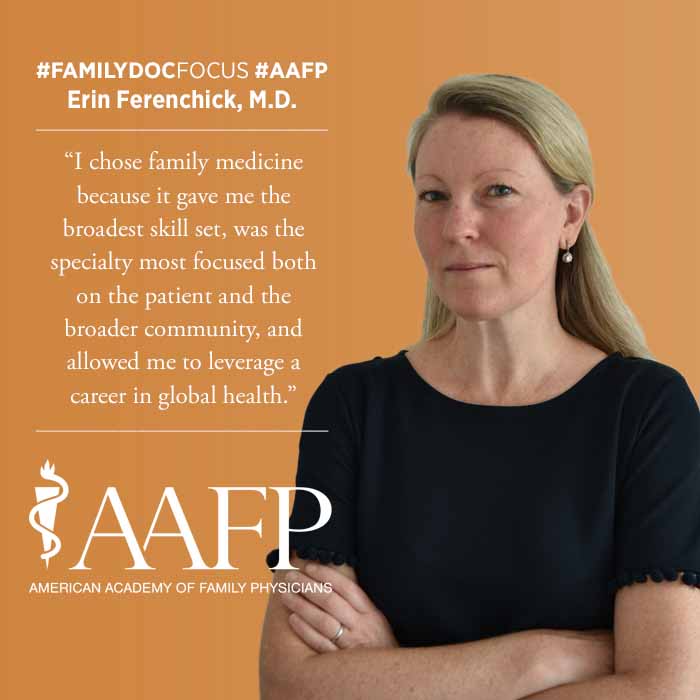Family Medicine Is Key to Her Career in Global Health
July 27, 2020, 01:20 pm David Mitchell – After graduating from Princeton University with an undergraduate degree in anthropology, Erin Ferenchick, M.D., spent a year as a fellow for Princeton in Africa, performing needs assessments, securing grants and supporting project implementation to address important issues like maternal-child health for the International Rescue Committee in Somaliland. She then spent two years as executive director of PiAf, which offers fellowships in public health, education, conservation, social entrepreneurship and microfinance.

"I enjoyed the work, but I realized I needed a more solid and tailored technical skill set to contribute in a sustainable and impactful way, so I went to medical school," Ferenchick said. "I chose family medicine because it gave me the broadest skill set, was the specialty most focused both on the patient and the broader community, and allowed me to leverage a career in global health. I've tried to keep one foot in the clinical world and one foot in global health, which is more focused on policy and programming. It's not always an easy balance to meet."
Ferenchick's clinical role is as an assistant clinical professor of medicine in the Center for Family and Community Medicine at her alma mater, Columbia University Medical Center. The pandemic has temporarily restricted her ability to travel regularly to New York for patient care, so she is now teaching and mentoring students and residents remotely from Geneva, where her public health role is based as a primary health care technical advisor for the Global Fund to Fight AIDS, Tuberculosis and Malaria.
"I have had good fortune in that Columbia values me both as a clinician and in my role as a public health advocate and the larger work I do in health systems strengthening," she said.
With the Global Fund, Ferenchick's role involves supporting countries' strategic investments in building resilient and sustainable systems for health with an emphasis on strengthening primary care to improve health outcomes for HIV, TB and malaria. Before taking her current role in 2018, she had worked as a long-term consultant not only for the Global Fund but also the World Health Organization and Gavi, the Vaccine Alliance.
Ferenchick will share her insights on working with governments and global health financing institutions, including the Global Fund, during the virtual Global Health Summit Sept. 16-18.
"There are a lot of family physicians interested in global medicine, and they find opportunities for short-term exchange programs or mentoring and teaching roles," she said. "But I don't think many are fully aware of the possibilities of engaging with these larger institutions."
The Global Fund invests more than $4 billion a year to support programs in more than 100 countries. For example, Ferenchick worked on an adolescent health project in the Democratic Republic of the Congo that allowed health care workers to participate in a monthly collaborative learning experience aimed at strengthening their skill sets specific to caring for adolescent patients with respectful and clinically sound care. The Global Fund provided financial resources and technical support for the implementation of the project as part of its larger scope of work on reducing the vulnerability of adolescents, particularly girls and young women, to HIV. The World Health Organization will be conducting an evaluation of the project to assess its impact in the coming months, she said.
Doing such work, Ferenchick said, requires both clinical and public health perspectives.
"Family medicine is very rooted in the principles of people-centered care," she said. "Family physicians have an important voice in steering the direction we invest in both domestic and global health, specifically in primary health care, to meet patients' complex and many needs. COVID-19 has shown us the importance of primary health care and what happens when primary health care systems are weak."